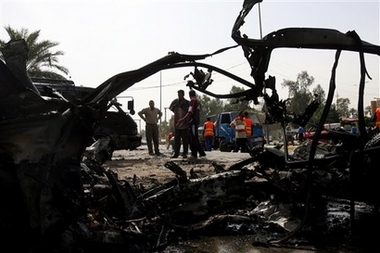16 US soldiers hurt in Baghdad battle
(AP)Updated: 2007-04-11 09:05
BAGHDAD - A raging, daylong battle erupted in central Baghdad on Tuesday and four Iraqi soldiers were killed, 16 US soldiers were wounded and a US helicopter was hit by ground fire at the close of the second month of the massive security crackdown on the capital.
 People stand by a twisted metal of what was a car bomb near university in Baghdad, Tuesday, April 10, 2007. [AP]  |
The security crackdown, which began Feb. 14 and will see nearly 170,000 American forces in Iraq by the end of May, has curbed some sectarian attacks and assassinations in the capital. But violence continues to flare periodically in Baghdad and has risen markedly in nearby cities and towns.
The fierce fighting in central Baghdad shut down the Sunni-dominated Fadhil and Sheik Omar neighborhoods just after 7 a.m., the US military said. After American and Iraqi troops came under fire during a routine search operation, helicopter gunships swooped in, engaging insurgents with machine gun fire.
Some Arab television stations reported an American helicopter was shot down in the fight, and showed video of a charred piece of mechanical wreckage that was impossible to identify. The US issued a statement late Tuesday saying an attack helicopter suffered damage from small arms fire but returned to base.
Several blocks from the battle, a rocket slammed into a schoolyard basketball court, killing a 6-year-old boy. AP Television News videotape showed children's backpacks and books still open on classroom desks, covered with shattered glass and debris. Blood was pooled on the dusty tile floor.
Police said it was a stray Katyusha rocket that dug into the asphalt playground and at least 17 were wounded ¡ª 15 students and two teachers.
The resumption of violence was in stunning contrast to Monday, when a 24-hour driving ban left the capital eerily quiet on the fourth anniversary of its capture by American forces.
But just hours after the ban was lifted before dawn Tuesday, artillery fire echoed across the city. By day's end, at least 52 people were killed or found dead nationwide in strife confined mainly to Sunni enclaves.
Prime Minister Nouri al-Maliki, who is visiting Japan, rejected an immediate US troop withdrawal, as called for on Monday by his fellow Shiites in a huge demonstration in the holy cities of Kufa and Najaf. The demonstrations were ordered up by radical Shiite cleric Muqtada al-Sadr, whose political support put al-Maliki in office.
"We see no need for a withdrawal timetable. We are working as fast as we can," al-Maliki told reporters during his four-day trip to Japan, where he signed loan agreements for redevelopment projects in Iraq.
"To demand the departure of the troops is a democratic right and a right we respect. What governs the departure at the end of the day is how confident we are in the handover process," he said, saying "achievements on the ground" would dictate how long American troops remain.
Al-Maliki has repeatedly rejected setting a timeline for US troops to withdraw. He has said it remains impossible to say when his forces will be able to take up full responsibility for security. Beyond that, his government is perilously weak and could easily fall without American backing, both politically and militarily.
The US military announced the deaths of four more soldiers ¡ª three killed by a roadside bomb and secondary explosion in southeastern Baghdad and a fourth in combat in Iraq's western Anbar province.
The roadside bomb victims had been conducting raids against militants in the area, and had recently captured five suspects, the military said in a statement. All were killed Monday.
At least 3,285 members of the US military have died since the beginning of the war in 2003, according to an Associated Press count. The figure includes seven military civilians.
In Muqdadiyah, most of the victims of the woman suicide bomber had taken police exams just days earlier and were assembled to learn the results, said a policeman, who would not give his name because he was not authorized to talk with reporters. Dr. Abdul Salam al-Jibour at Muqdadiyah General Hospital said 33 in the group were wounded.
At a checkpoint near Baghdad University, six civilians were killed when a yellow taxi car bomb exploded.
And in the southern city of Basra, British forces carried out a search operation in the Qibla neighborhood, where an exchange of fire left one policeman dead and 13 civilians hurt, said police Lt. Col. Karim al-Zeidi.
|
||
|
||
|
|